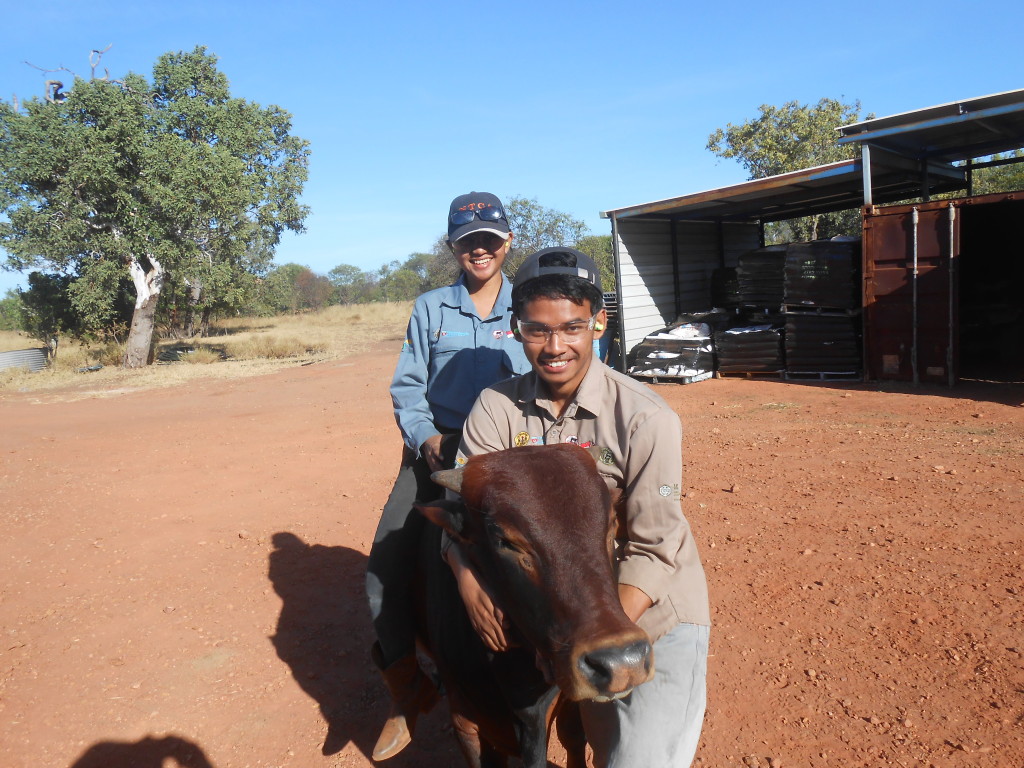Indonesia Australia Pastoral Industry Program – what’s it all about?
Written by Libby Doney – Program Coordinator, Northern Territory Cattlemen’s Association.
Photos courtesy of the Northern Territory Cattlemen’s Association and Kerry Sharp.
It’s the last day of April, and at 3.00am I blunder my way out to the car and drive through the deserted streets to collect my colleagues, Mick and Alward, from their hotel. We are heading out to the Darwin Airport to meet 16 Indonesian university students who are about to embark on a two month, life-changing experience. Half way to the airport I receive a frantic text . . . “Where are you? The student’s plane has landed!” Shite! It’s from Adrian, one of our contacts at the Indonesian Consulate in Darwin.
Mick, Alward and I work for the Northern Territory Cattlemen’s Association (NTCA). Along with our Indonesian colleague Robi, we had been meticulously planning and organising for the student’s arrival for months, and now it seemed we wouldn’t be on time to meet them! Dang the crazy middle of the night arrival times of most flights into Darwin!
Parking haphazardly, we all tore out of the car and rushed into the arrivals area. Here they are! Robi grinning his usual wonderful grin, and bleary-eyed, but bright and chatting excitedly to one another, the students who are this year’s participants in the Indonesia Australia Pastoral Industry Student Program.
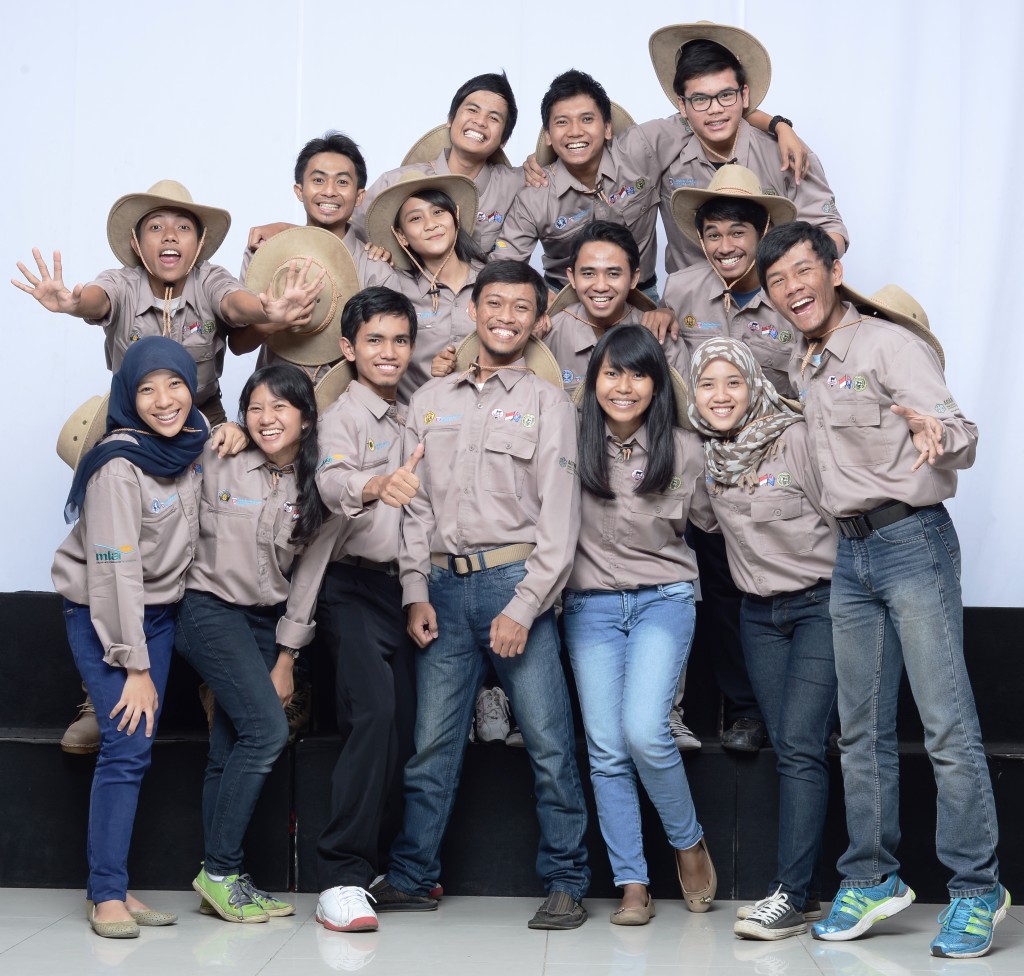 Getting ready for the program – 2013 students.
Getting ready for the program – 2013 students.
Mick and Alward re-acquaint themselves with everyone, having been part of the team who selected the students for this year’s program, and then introduce me. One by one we shake hands and smile at each other. Out into the sticky night air, we round up students and their mountains of luggage and bundle everyone into waiting buses. Ardian smiles broadly at me as we say goodnight, “So, they are finally here!” The adventure has begun . . .
It’s no news to anyone with north Australian pastoral industry knowledge: the banning of live export in 2011 seriously damaged our relationship with Indonesia. Rather than waiting for “someone” to fix the problem, the NTCA, as it has so many times before, immediately set about exploring ways of repairing, rebuilding, and redefining industry connections and relationships between the Indonesian and north Australian beef cattle industry. So the Indonesia Australia Pastoral Industry Student Program was born.
At its basic level, it is a deceptively simple formula – an international student exchange program that includes training, and work experience. But this program has big, long-term ambitions: to build relationships, resilience, and sustainability in the Indonesian and north Australian beef cattle industries, through people to people exchange, and skills and knowledge sharing. To do this, a program was needed that involved players from across the industry spectrum – international company managers, students, Australian ringers and stockmen, station managers, educational institutions . . . We needed to expose industry players from both countries to “the other” in real, and meaningful ways.
With a focus on the future, the obvious place to start developing a program was with young people who would be involved in the industry in mind. Through contacts and networks in Indonesia, relationships with two universities – Padjadjaran in Bandung, and Brawijaya in Malang, were established. A framework for a student exchange program was established; the clear and agreed focus for the program was to not only impart practical and technical learning but to establish and expand relationships for mutual growth and benefit.
A Memorandum of Understanding was signed between the NTCA and the university’s Animal Husbandry Faculties in March 2012, and eight young, trail-blazing Indonesian students arrived in Australia in May. They did a week and a half of intensive industry training at Bohning Cattle Yards, and were then sent out to cattle stations across the top end of the Northern Territory for six week work experience placements.

The students did their industry training with participants from the Real Jobs Project (RJP). For some, they also undertook the station placements with their Indigenous counterparts from the training. This resulted in unanticipated, but invaluable cultural exchange and learning between the Indonesian students and the Indigenous RJP participants, with whole new worlds of understanding opening up for both sides. Two of the Indigenous guys also joined a delegation of station hosts and NTCA employees visiting Indonesia to reconnect with the students and tour Indonesian industry facilities.
Not surprisingly, the program attracted a lot of national media interest, featuring on ABC’s Landline program in November 2012 – http://www.abc.net.au/landline/content/2012/s3541331.htm.
Fast forward to early 2013. Based on the success of the pilot, the NTCA was able to secure resources and funding to allow refinement and expansion for the 2013 Student Program. This included being able to employ a full-time coordinator (me!) as well as our Indonesian Coordinator, and enough funding to double the number of participants and to deliver accredited training as part of the program. This is the 2013 program broken down into its component parts:
An important aspect of the program development process was expanding our relationships with Indonesian educational institutions. Under the auspice of the Indonesian Society of Animal Science (ISPI, representing Animal Husbandry Faculties of Indonesian universities), the NTCA has now signed a new Memorandum of Understanding with six partnering Indonesian universities – the original two, plus Bogor Agricultural Institute, Bogor, Java; Gadjah Mada University, Jogyakarta, Java; Mataram University, Mataram, Lombok; and Nusa Cendana University, Kupang, W. Timor. The MoU was signed by the university’s representatives at the NTCA Conference in March 2013.

There were collectively well over 100 Animal Husbandry students who expressed an interest in joining the 2013 program. After being put through a rigorous screening and selection process sixteen students from five universities were awarded a place – five young women, and eleven young men. One of the characteristics we were looking for in the students was a demonstrated willingness and capacity to share their experiences and learning with their fellow students, lecturers and colleagues on their return to Indonesia. This is critically important if we are to, over time, achieve a critical mass of awareness, knowledge and understanding about north Australian pastoral industry practices, especially in relation to animal welfare issues, in Indonesia.
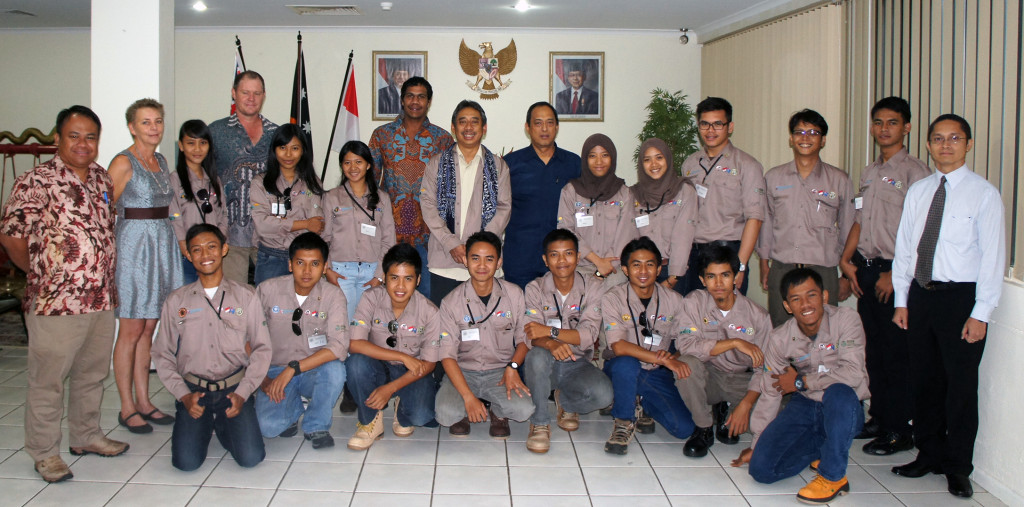
Nothing can really prepare an Indonesian national, especially those from crowded Java, for the north Australian landscape, with its lack of population and seemingly empty, endless horizons. The student’s first taste of this was the journey from Darwin to Katherine, where they spent their first two weeks in Australia training at the Katherine Rural Campus of Charles Darwin University. Between dozing and chatting about families, university studies, and hopes and fears about participating in the program, the four students travelling in my vehicle expressed endless amazement at the miles and miles of unpopulated stretches along the highway. This sentiment was echoed amongst all of the students throughout the program.
After completing their training – primarily focused on learning skills that would be required for the station placements such as cattle handling, basic horsemanship, riding quads and motorbikes, and OH&S including emergency first aid – the students were, at last, delivered to their host stations. They were sent in pairs – experience from the 2012 program had taught us that this would help students to settle in more quickly, and help to circumvent students feeling isolated or lonely.
North Australian pastoralists, corporate and family enterprises alike, have truly embraced the program. This year’s hosts were the family stations of Cave Creek, Birdum Creek, and Lakefield, and the corporates Birrindudu, Pigeon Hole, Camfield, Moolooloo, Victoria River Downs, Newry, and Auvergne. To ensure the broadest exposure possible to the cattle industry in northern Australia, the students at family stations were swapped to corporates at the half way mark of the placement.
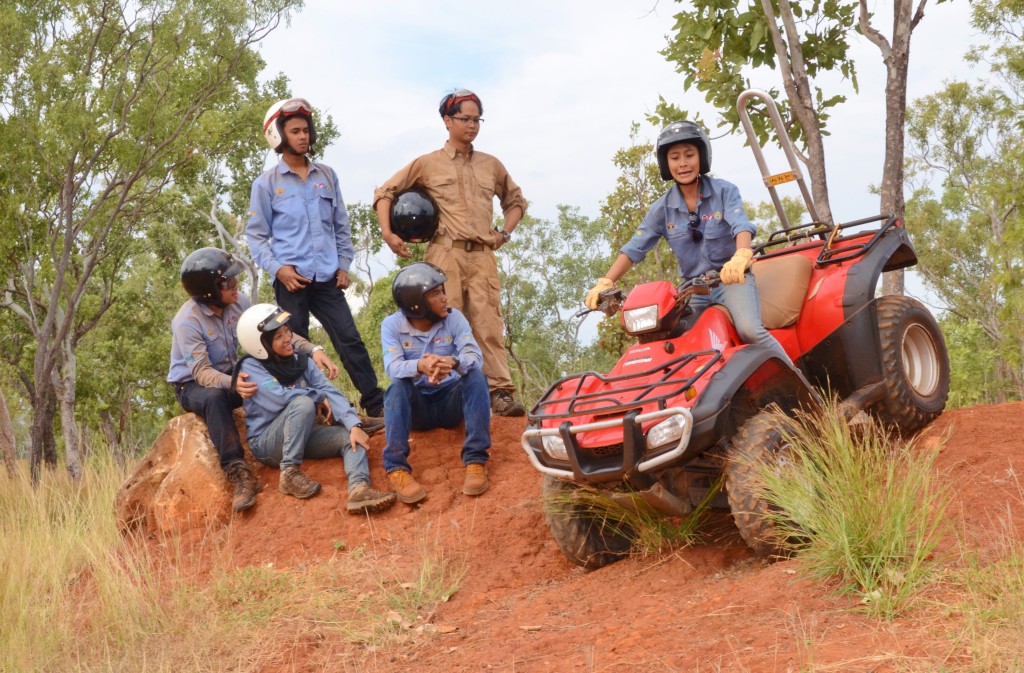
The students experienced the full range of station life, no matter where their placement was. From being sent out to stock camps for mustering, to fixing fences, to preparing feed supplement, to branding, castrating and vaccinating, to picking up rocks from the air strip, to heading into town for a camp draft for the weekend – the students soaked it all in. Jak Andrews, from Auvergne Station perhaps sums up best what a good part of the station placements were about . . . he says that the lessons learnt, and the friendships formed will go a long way to helping the cattle industry’s relationship with Indonesia: “It’s a long term investment, and it’s about bringing that next generation through.”

Highlighting the value of the program from a diplomatic and Indonesian trade development perspective, in May the NTCA was invited to Canberra to introduce three of the students to the former Prime Minister, Julia Gillard, senior Government Ministers, and the Indonesian Ambassador Pak Nadjib Riphat Kesoema.

Accompanied by their Indigenous mentors the students were wonderful representatives for their country, and true ambassadors for the program. They all conducted themselves beautifully throughout the trip.
From helping to sharpen up where their future careers would take them (the beef cattle industry of course!), to learning quirky Australian colloquialisms, to making enduring friendships, from the student’s perspective, the general sentiment was that participating in the program was “life-changing”. In an evaluation, the majority of the students rated the most valuable aspects of the program as “learning so much about the cattle industry” and “learning about Australia and Australian culture”. For station hosts, it was “the cultural exchange”.

An exchange trip to Indonesia for station host employees is being planned for early September. This component of the program, basically, brings the program full circle. It allows Australian industry members to not only reconnect with students, but provides an opportunity to meet Indonesian producers and industry members and to tour Indonesian facilities, thereby helping to raise knowledge and awareness of the beef cattle industry context of our Indonesian neighbours and partners.
So . . . what does the future hold for the Indonesia Australia Pastoral Industry Program? Through formal evaluation processes, an enormous amount has been learnt from the 2013 program. This information is being used to further refine the program, and funding permitting, it will continue to grow and be the wonderful success story that it has been so far. An ultimate goal would be to expand the program, and the benefit that it brings, right across the north Australia pastoral industry, from Queensland to Western Australia.
Finally, I would like to acknowledge the NTCA staff, and others, without whose efforts the program could not have been delivered, and who have made the program the success it is: Luke Bowen, Mick Armstrong, Alward Foster, Noel Cuffe, Robi Agustiar, Pak Ade from the Indonesia Consulate in Darwin and his fantastic staff, our generous host stations, and of course our wonderful 2013 students.



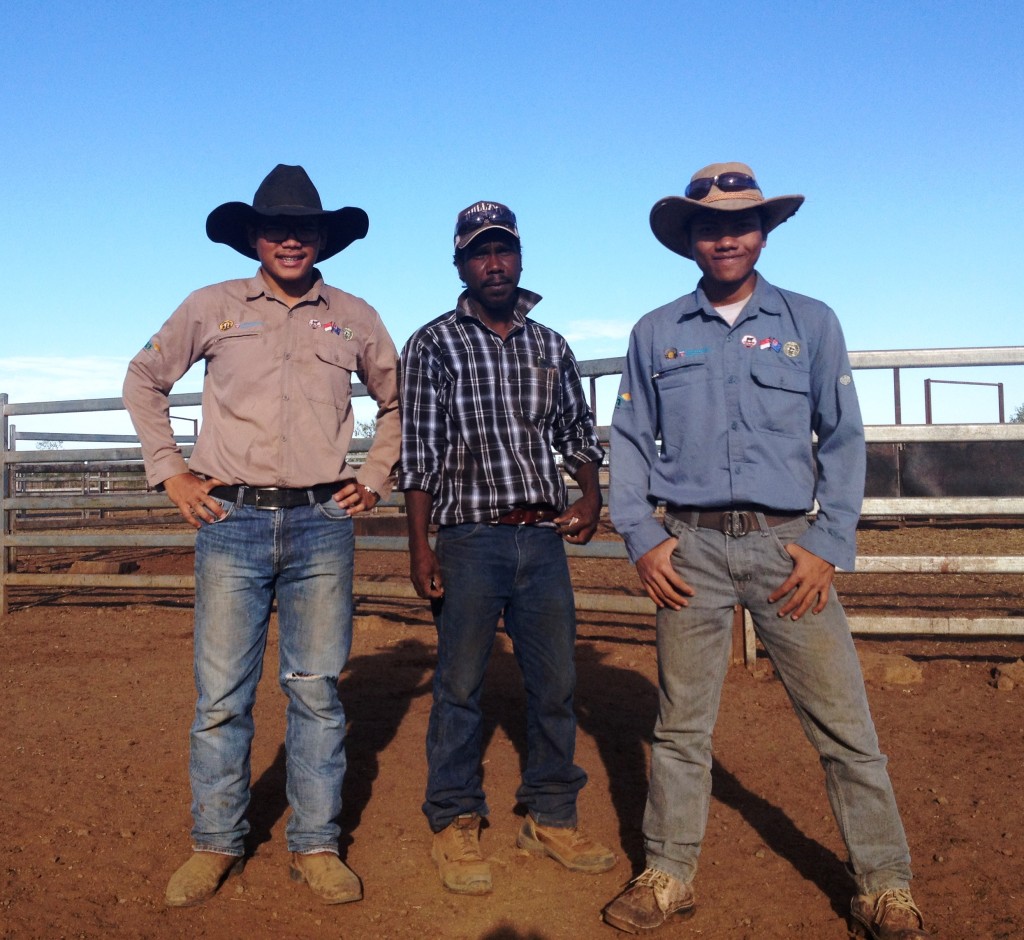
The Northern Territory Cattlemen’s Association acknowledges and is grateful for the support and funding from the Australian Centre for International Agricultural Research, the Department of Regional Australia (Office of Northern Australia), Meat and Livestock Australia, and the Northern Territory Government to run the 2013 Indonesia Australia Pastoral Industry Student Program.




